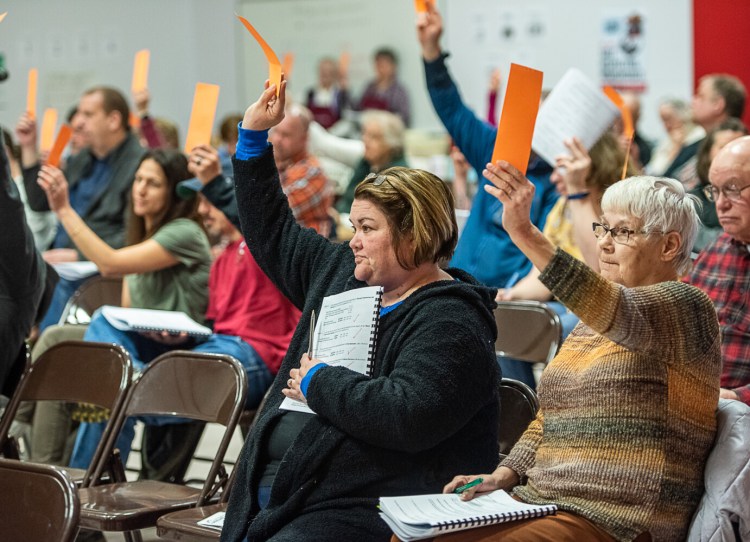With the slow but sure melting of the snow and the gradual rise in temperatures comes a beloved New England institution, especially in Maine, New Hampshire and Vermont: town meetings.
Here in New England a town meeting isn’t just a forum held by some ambitious politician running for higher office, it’s a governing institution. Although your local board of selectmen runs the municipality on a day-to-day basis, once a year the citizens of the town have to come together to actually govern the place. They approve the budget and any new ordinances and hear reports from town officers. It’s a lovely thing, seeing democracy in action at such a local level, and one of our most cherished traditions.
Unfortunately, it may not be long for this world.
Town meetings usually occur in March and April, and many towns have already conducted theirs for the coming budget year. They’re the lucky ones. Local municipalities that haven’t yet conducted their town meetings are going to find themselves running up against a unique challenge this year: the novel coronavirus, COVID-19. With the state ban on gatherings of more than 10 people, not even the smallest towns in the state can move forward if they want to follow the Centers for Disease Control and Prevention’s advice.
Quite apart from the size of the crowd, there’s the issue of who tends to attend town meetings in even the small towns. If you’ve ever been to one, you know that the crowd usually tends to skew toward the older demographic. Just as someone is more likely to vote the older they are, they’re probably also more likely to attend their town meeting. Unfortunately, these people are also the exact demographic most vulnerable to COVID-19, and who are most advised to begin practicing social distancing all over the country.
The question for New Englanders is not just whether to postpone or cancel town meetings this year, but also whether this is a temporary change or part of the new normal after the virus is better contained. This is a question both for the governmental town meetings we hold in Maine, as well as for the political kind.
Much of that decision will be based on many medical unknowns regarding this particular disease. If the United States does an effective job containing COVID-19, most of our day-to-day life will revert to normal – eventually. Sporting events will be back on; bars, shops and restaurants will reopen, and concerts will continue. Other changes may be more permanent, and that could be a good thing: If people got better at washing their hands (and personal hygiene in general), that could permanently improve public health. It would also be an upgrade if we, as a nation, could expand our use of technology in the education and health care fields for good, especially in rural states like Maine. That could both expand our capacity and reduce costs, saving lives while simultaneously saving money long term, instead of making a decision between the two.
We shouldn’t let any short-term public health crisis undermine our democracy in the long run, though. Once the current crisis subsides, we should reopen all governmental meetings to the public and return to town meetings next year. Generally, we should use this crisis as the basis for future ways that we could improve upon our traditions, rather than abandon them completely. In the case of town meetings, as video streaming technology has become cheaper and more readily available, towns that don’t stream their meetings should start doing so. We could even consider rule changes that allow people to participate remotely, at least in a limited fashion as the technology allows.
Once the virus is contained, the United States should lead the world in a return to normalcy as soon as we safely can. Just as we ought to be a leader for the world in response to the challenge before us, we need to be a leader in recovery as well. We’ve always been a shining beacon of light for the entire world, and we should never let any temporary crisis scare us away from being a leader in liberty and democracy.
Jim Fossel, a conservative activist from Gardiner, worked for Sen. Susan Collins. He can be contacted at: jwfossel@gmail.com
Twitter: jimfossel
Send questions/comments to the editors.


